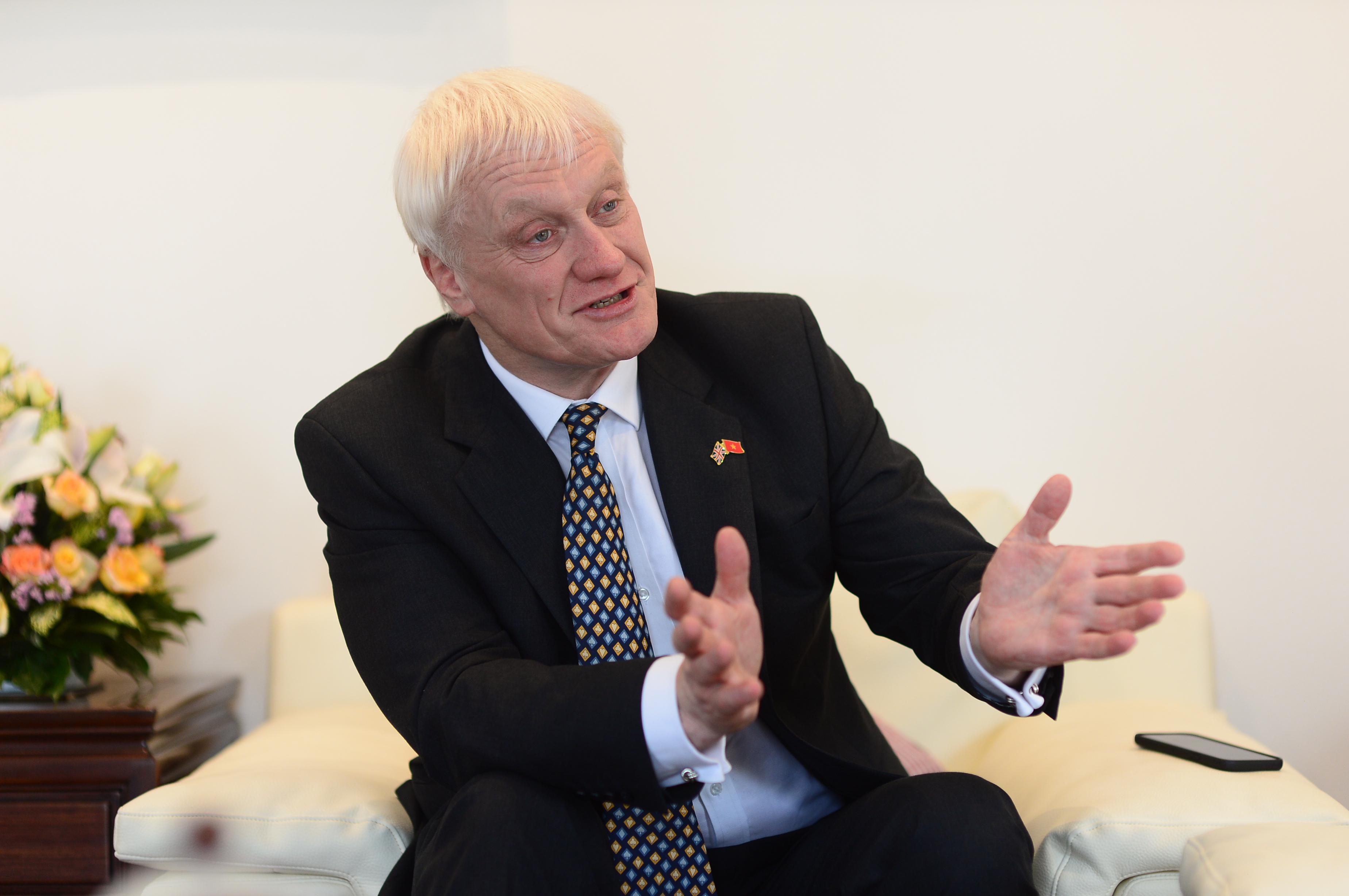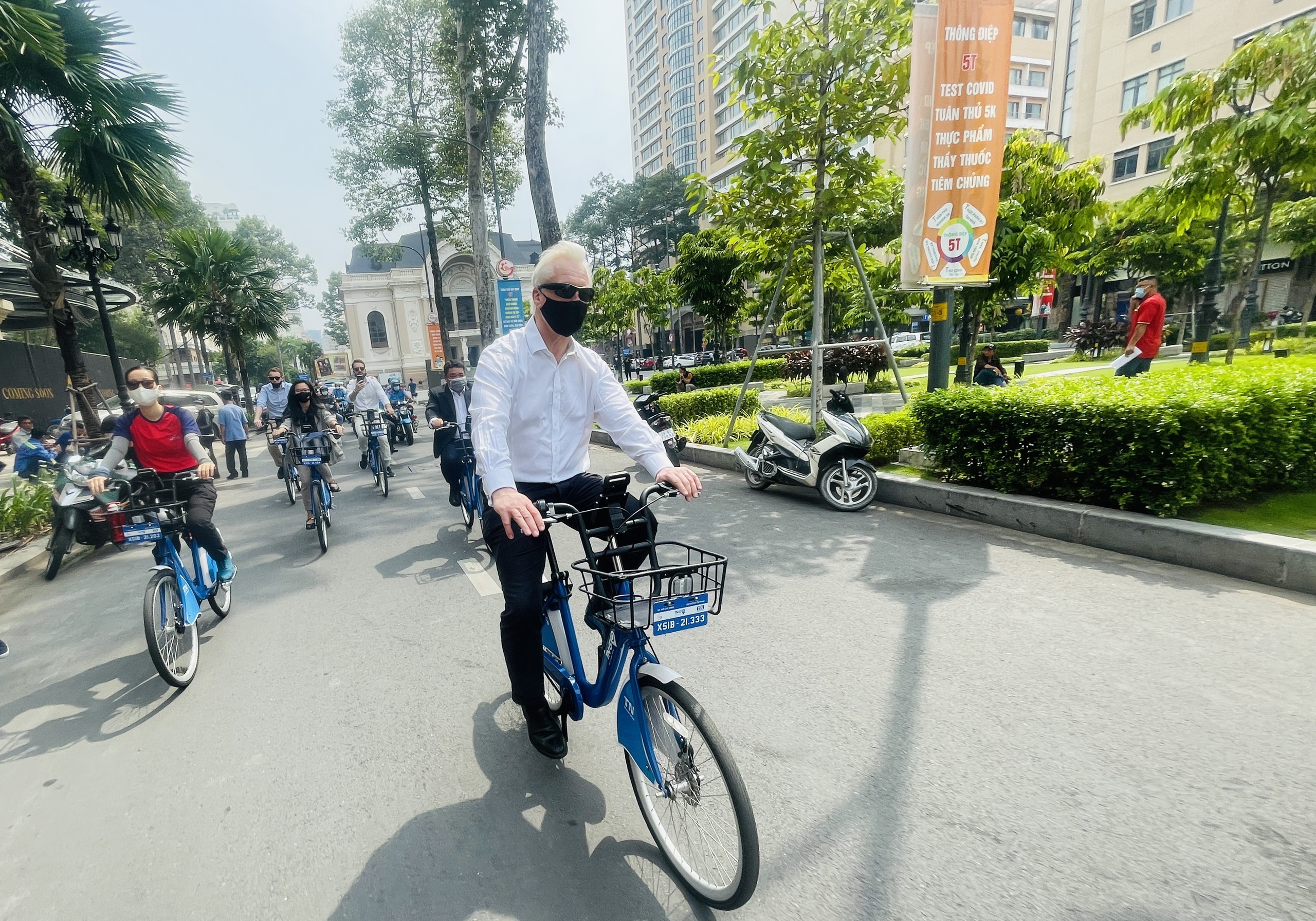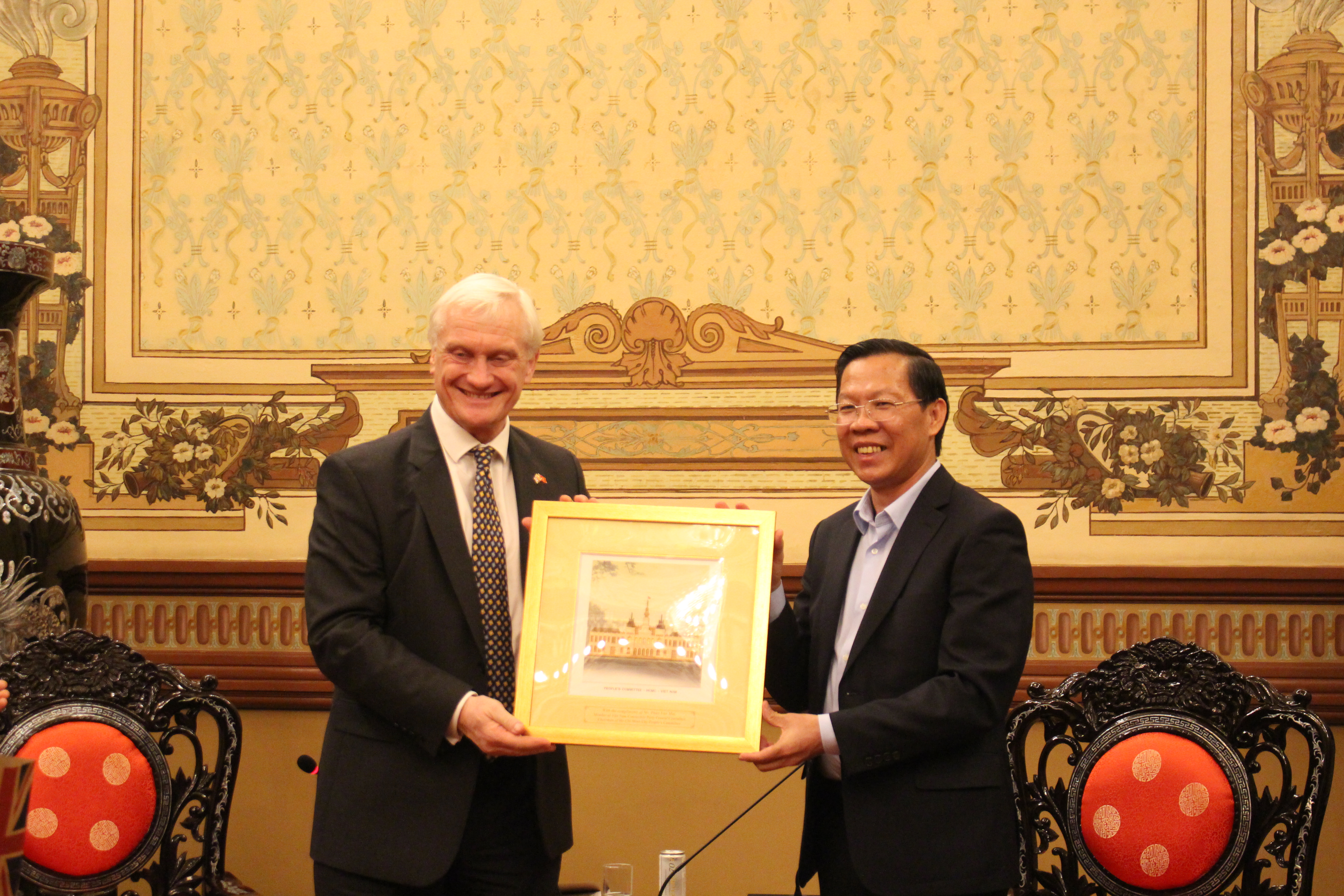“The big message at the moment is do not be overly dependent on any one country and Vietnam, of course, has long sought to maintain a form of neutrality and make sure it is friends with as many as possible, which is very wise,” the UK’s Graham Stuart told Tuoi Tre News last week.
During his very first official visit to Vietnam from April 4 to 8 since being appointed the UK Prime Minister's Trade Envoy to Vietnam, Cambodia, and Laos, Stuart put green technologies in focus as he seeks to promote UK – Vietnam trade relations.
In an exclusive interview with Tuoi Tre News on April 7, he explained how the UK’s clean growth strategy fits the 'Indo-Pacific shift' in the Global Britain policy, and how the UK and Vietnam can cooperate amid the current challenges posed by the situation in Ukraine and China’s zero-COVID policy.
He emphasized the need for working together, creating a diverse supply chain, and committing to international trade.
What are the top priorities of your trip to Vietnam, and particularly to Ho Chi Minh City?
In terms of my priorities for this trip, it is my first trip to Vietnam since being appointed the Prime Minister's Trade Envoy to Vietnam, Cambodia, and Laos.
Overall, the role of a trade envoy is to promote trade engagement between the two countries, to encourage businesses in the UK to understand and get involved in opportunities in Vietnam, to engage with businesses in Vietnam, and to encourage them to see opportunities by partnering or indeed exporting to the UK.
A particular pick-out would be green technology whether that is transportation, offshore wind, solar energy, upgrading the Vietnamese grid, or other technology. That is probably the top priority right now, given that Ho Chi Minh City has set out a pathway to a greener city.
Most notably, at one of the most significant events of the COP26 Climate Summit last year, Prime Minister Pham Minh Chinh announced that Vietnam would commit to move to net zero by 2050.
|
|
| UK Prime Minister’s Trade Envoy to Vietnam, Cambodia, and Laos Graham Stuart checks out the public bicycle service in Ho Chi Minh City, April 7, 2022. Photo: Le Phan / Tuoi Tre |
So I think the UK is a world leader in reducing emissions. In fact, we have reduced emissions by more than any other major economy in the world, any of the top 20 economies in the world. At the same time, we have grown the economy. We have a lot of expertise in designing regulatory and legal systems, incentivizing international investment, and driving down the cost of the delivery of systems such as offshore wind, so that will probably be the top priority, but there are many others.
And lastly, I would highlight education whereas there are so many senior people in the government and industries in Vietnam who have been educated in the UK. I was privileged to open the first British branded private school in Vietnam and Reigate Grammar School when I was in Hanoi the other day.
Can you tell us more about the potential for cooperation between Vietnam and the UK in financial technology?
We are the digital and tech leader in Europe in terms of investment and our fintech and startup scene. Similarly, here in Vietnam, there is a tremendous entrepreneurialism. Your strong education system is producing people who, I think, create 120 fintechs here. And so there is opportunity for us to partner and mutually benefit each other in the technology space.
Fintech, of course, brings in another area of priority: financial services. With the city of London, the UK is the global leader in cross-border finance. Meanwhile, Ho Chi Minh City and Vietnam have ambitions to develop the city as a financial center.
My meeting [on April 5] with Ho Chi Minh City chairman Phan Van Mai was a really constructive one. I look forward to us developing closer partnerships to help Vietnam and Ho Chi Minh City in that space.
The UK-Vietnam Free Trade Agreement (UKVFTA) came into effect last year in a challenging period, with COVID-19 peaking in Vietnam. But against the odds, two-way trade between Vietnam and the UK still reached US$6.6 billion in 2021, up 17.2 percent compared to 2020. Is this result in line with expectations from the UK side?
About the FTA, I was at the ministerial talks last week in London between Deputy Minister of Industry and Trade Tran Quoc Khanh and UK Minister of State at the Department for International Trade Penny Mordaunt. We were looking at the progress of the implementation of the UKVFTA.
As you say, we have seen a significant increase in trade between the two sides. There is still so much potential for more, not least in the areas that I have identified previously. I do not think that relations between Vietnam and the UK have ever been as warm as they are today.
We seem entirely aligned from the climate pledges through to aspirations to develop digital government and to help Vietnam be a genuine part of the international financial system as well as get the international investment it needs to fulfill its desires to become a fully developed country by 2045.
The world is currently facing many difficulties such as the situation in Ukraine and the lockdowns in some major Chinese cities important for international trade. How can countries like Vietnam and the UK work together to protect our economic growth, energy security, and supply chains?
In the context of the pandemic, both the UK and Vietnam took a little time to work out the right approach, but then went on to be world leaders in vaccination and in being able to open up the economies again. Within Vietnam, Ho Chi Minh City has a particular success in that respect. So both of us have shown adaptability, the ability to change course when the facts require it. And that will help us in dealing with the challenges globally.
I do not believe trying to do everything by yourself actually makes you more resilient, often when responding to a crisis, whether it was a pandemic or the current pressures right now. Actually, you are more resilient when you create diverse supply chains, you stay committed to international trade. I know that is the approach of both the Vietnamese and UK governments.
|
|
| Ho Chi Minh City chairman Phan Van Mai (R) presents a souvenir to UK Prime Minister’s Trade Envoy Graham Stuart in Ho Chi Minh City, Vietnam, April 5, 2022. Photo: British Embassy in Hanoi |
The big message at the moment is do not be overly dependent on any one country and Vietnam, of course, has long sought to maintain a form of neutrality and make sure it is friends with as many as possible, which is very wise.
The UK has set out its ambitions in the Global Britain strategy. How does the clean growth strategy fit the British ambitions in the Indo-Pacific region?
We also produced something called the Integrated Review that looked at across multiple domains, and stated what our priorities should be going forward. Within that was something called the Indo-Pacific shift. And that is what the whole focus of the UK government has moved towards. Therefore, we very much see Vietnam -- a country of 100 million people with expected growth rates of 6-7 percent, with whom we have good relations -- as a key part of our future foreign policy and trade policy going forward.
Clean growth is a perfect fit [for Global Britain], which is why we were so delighted with the announcement of Vietnam at the COP26 summit that we hosted. As I said at the beginning, we are entirely aligned and aware that part of the Indo-Pacific shift fits with our trade strategy, which is to re-balance UK trade with the fastest-growing parts of the world. And there are very few parts of the world growing as fast as Vietnam.
In general, what is Vietnam's position in the UK's strategy in the region?
Vietnam is still a developing country. Therefore, I think we can very constructively work with Vietnam to help with legal and regulatory changes that allow the investments and the improvements that need to be made.
If you do not get those right, then you will not see the investments in the right way, you will create perverse incentives. Or you will find that whatever you may wish for, you do not get the implementation at the speed you like.
For example, one thing we got right was the regime we created for so-called Contracts for Difference for offshore wind. We created an auction system and set up a regular series of auctions, so that the industry knew that there was going to be a pipeline of work, which meant that they would invest in their supply chain and we saw the auction in 2015. The lowest price the industry would accept per megawatt for offshore wind was 120 pounds [US$156] at the time. It dropped in 2017 and came down to 39.5 pounds [$51.4] in 2019.
If you create the right regime, and you provide that certainty, then you can see an acceleration of the cost curve downwards. I see the potential in Vietnam to be one of the most effective producers of clean energy in the world. That will be great for the domestic economy, great for the local environment and will help give further competitive advantages to what is already a competitive Vietnamese economic system.
COVID-19 brings expensive lesson on global supply chains
Answering Tuoi Tre News at the UK-ASEAN Business Forum on February 24, UK Secretary of State for International Trade Lord Gerry Grimstone said that the UK and ASEAN had received great lessons in facing recent challenges:
“It will be very obvious to us that, prior to the pandemic, we thought globalization was a magic force, which would allow any goods that you wanted to arrive from anywhere in the world at any time that you wanted. I am afraid that the whistle was blown on that during the pandemic… Frankly, the other big surprise was how little knowledge even our largest companies have of their supply chains once they went down below their tier-one suppliers.
"And I think it taught everybody a lesson about resilience, having diversity of supply, understanding who your suppliers are, and encouraging your suppliers. And I think that ASEAN and the UK are really well placed together to try to be leaders in developing diverse supply chains.”
Like us on Facebook or follow us on Twitter to get the latest news about Vietnam!





















































